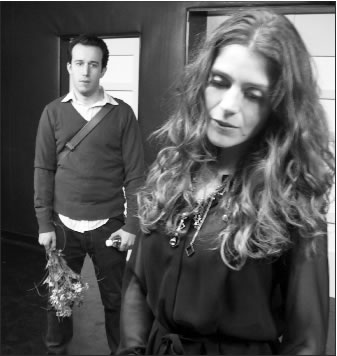By STEVEN SNYDER
For playwright Itamar Moses, theater imitates romance
As far as Itamar Moses is concerned, his self-reflective dramas are bold acts of theatrical honesty. “Often I find that the process of making theater, of creating a play, naturally echoes what’s going on in the story,” he says, in between the final rehearsals for his latest play, “Love/Stories (or But You Will Get Used To It).” now showing at The Flea. “I can’t help but call attention to these parallels to the audience, because it feels like I’m lying to them if I ignore it.”
Throughout Moses’s career, he’s used drama as a method to explore the theatrical experience (or maybe it’s the other way around). In his first major work, “Outrage,” three parallel stories involving, respectively, a college student, Socrates and Bertolt Brecht. Characters addressing the audience to critique the plot devices at work interrupt the scenes continuously. One of his next plays, “Bach at Leipzig,” centered around musicians questioning their artistic approaches and methods – challenging one other to experiment with new musical genres, just as Moses’s script erupts in a second act, taking a mild-mannered intellectual debate into the realm of the absurd.
Then there was last year’s production of “The Four of Us,” allegedly inspired by Moses’s friendship with a famous Brooklyn novelist. The play prompted a discussion about artists struggling with the curse of fame.
In almost all his works, Moses has comments on the art of his artifice – challenging audiences to see the ways in which the rigid rules of theater can be bent out of shape. “I’m never doing it to be cute or to be clever,” he says. “In the process of writing something, what I start to notice is that there’s a parallel between what these characters are going through in relating to each other, and what I’m going through in relating to the audience. At some point, it becomes impossible for me to put one over on the audience, and so I work this discussion I’m having in my head into the play.”
With “Love/Stories” Moses has found a conduit through which he can compare universally shared ideals of love, and the way artists mold stories for an audience. Weaving together five one-acts, Moses creates a handful of scenarios that share romantic themes: attraction, infatuation, trust and heartache.
One scene features a casting session for a play that requires the characters to portray a couple falling out of love. Another tells the story of two lovers moving in with together for the first time, struggling to cope with the sort of intimacy that can only accompany cohabitation. In one scene, actors let down their guard and engage in a talk-back session with the audience, a discussion that leads them to reconsider the direction of their lives.
“It’s fascinating, the stories we tell ourselves and other people about love, as a way of making sense of something that really doesn’t make any sense, and the way that we tell each other stories in a theater to make sense out of life,” Moses says. “When I started curating the show and thinking about these issue, it was a comparison that became more unmistakable: love and relationships as a metaphor for making art and theater.” As the show has gone into rehearsals starring the Flea’s resident company of younger actors known as “The Bats,” Moses says he’s seen the actors respond to the connections between the text and their persona experiences, particularly the ways that the dating world mirror the stress and vulnerability of the audition process. “For some of the younger actors in the Bats, the audition scenes offered a strong echo,” Moses said. “They could connect with how someone might audition very, very well for a role, but then be a nightmare over the span of a full performance. Just a like a first date that doesn’t translate well into a relationship.”
While the conversation it stokes might be familiar to fans of Moses, “Love/Stories” has allowed the 31-year-old to experiment with a whole new variety of tempo and pacing. Breaking the show’s larger theme into shorter chapters afforded him a sense of control that playwrights rarely get to experience. “Short plays are very satisfying because you can actually get it just about perfect – you can get every single syllable in place,” Moses says. “Theater is a lot like music, and a short play is a lot like a hit, three-minute single. So you can do a lot with a production that’s composed of these shorter, tighter works. It frees you to create a world that looks and sounds exactly the way you envisioned.”



























